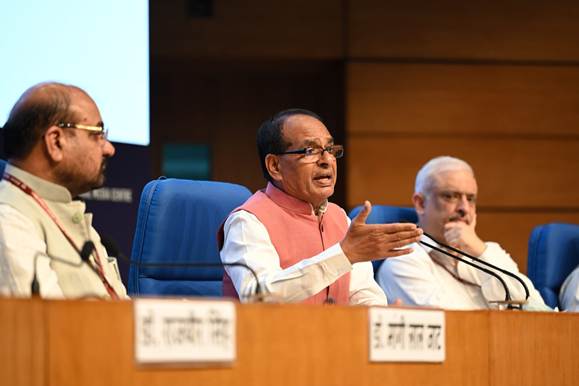In a move to transform Indian agriculture, Union Minister for Agriculture & Farmers Welfare and Rural Development, Shivraj Singh Chouhan announced the launch of the nationwide Viksit Krishi Sankalp Abhiyan, set to run from May 29 to June 12. Addressing a press conference at the National Media Centre, the Minister emphasized that the initiative is a key step towards realizing Prime Minister Narendra Modi’s vision of a developed India through modern, innovative, and sustainable farming practices.
The campaign will serve as a powerful platform to bridge the gap between research institutions and farming communities, ensuring that scientific advancements reach the grassroots level. Chouhan highlighted that developed agriculture, advanced farming techniques, and empowered farmers are critical pillars in building a developed nation. The Viksit Krishi Sankalp Abhiyan will be conducted biannually before the sowing of Kharif and Rabi crops to promote timely and relevant field-level interventions.
Under the leadership of the Ministry of Agriculture and the Indian Council of Agricultural Research (ICAR), the initiative aims to enhance food security for India’s 1.45 billion people, promote nutritional food access, increase farmer incomes, and conserve natural resources. The strategy rests on six core pillars: boosting production, lowering input costs, ensuring fair pricing, offering disaster compensation, encouraging crop diversification and value addition, and expanding natural and organic farming.
This year, India recorded unprecedented agricultural outputs. Kharif rice reached 1206.79 lakh metric tonnes, wheat 1154.30 lakh metric tonnes, maize 248.11 lakh metric tonnes, groundnut 104.26 lakh metric tonnes, and soybean 151.32 lakh metric tonnes. Total food grain production rose from 3157.74 lakh tonnes in 2023–24 to 3309.18 lakh tonnes in 2024–25. These record figures reflect India’s growing agricultural strength and align with the campaign’s vision of turning India into the “Food Basket of the World.”
The campaign will mobilize ICAR’s 113 research institutes, 731 Krishi Vigyan Kendras (KVKs), agricultural universities, state agriculture departments, farmer-producer organizations (FPOs), and innovative farmers. A total of 2,170 expert teams, each comprising at least four members, will visit over 65,000 villages across 723 districts. These teams will conduct morning, afternoon, and evening sessions with farmers to promote scientific farming methods.
Field assessments will focus on agro-climatic conditions, soil health, rainfall patterns, and water availability. Using Soil Health Cards, experts will recommend suitable crops, high-yield seed varieties, balanced fertilizer use, and modern sowing techniques. The aim is to reduce farming costs, improve soil health, and enhance productivity through precise and tailored guidance.
Importantly, the Viksit Krishi Sankalp Abhiyan is envisioned as a two-way engagement. Farmers will be encouraged to share their local challenges, such as pest issues and climate anomalies, which will in turn inform ongoing research. The initiative is expected to directly reach and engage more than 1.3 crore farmers, ensuring that agricultural progress is driven by both scientific expertise and farmers’ insights.














